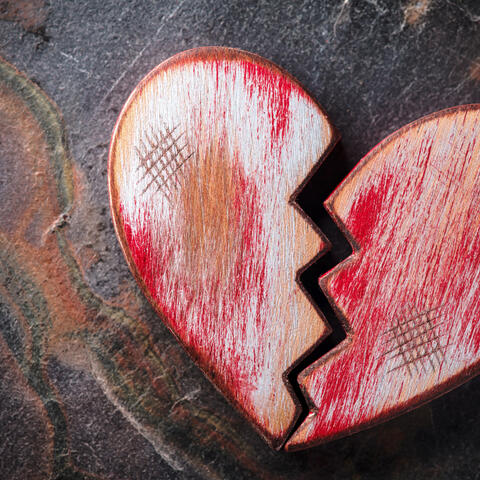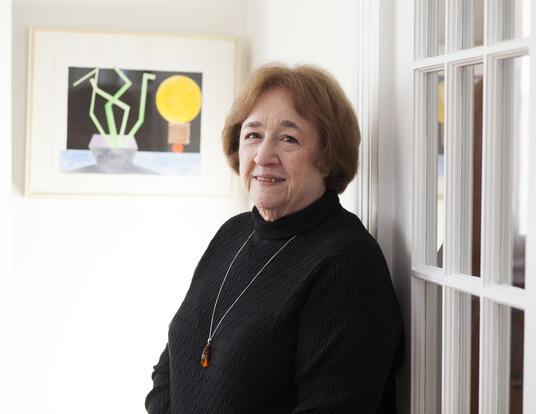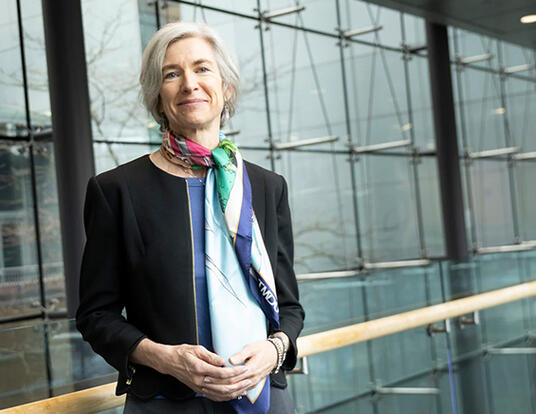Better in Real Life
GSAS graduates learn, connect during first in-person Alumni Day since pandemic
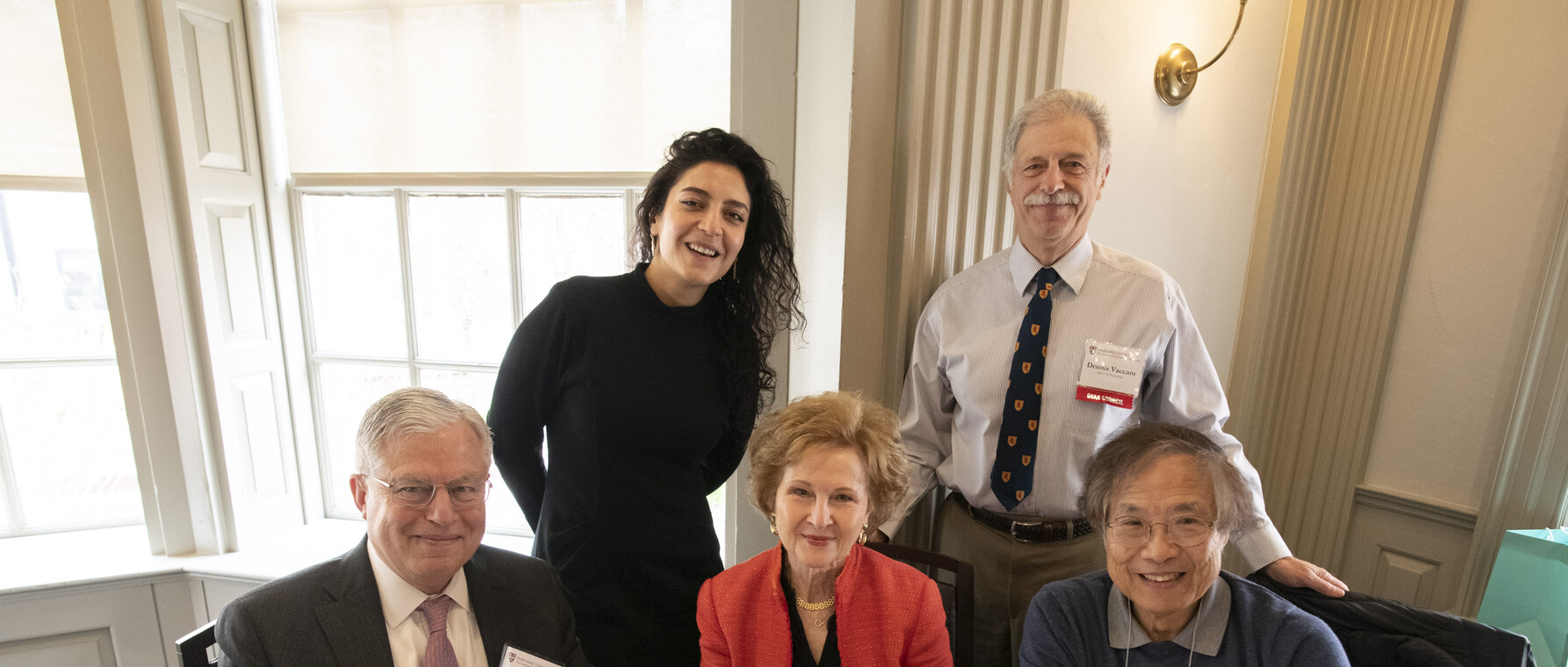
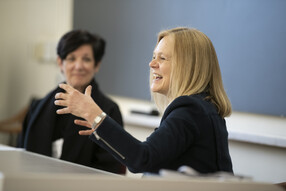
“Oh my goodness! We’ve loved seeing you on Zoom but this is huge, seeing people in 3D,” said GSAS Dean Emma Dench in her opening remarks for Alumni Day on April 9, the first held on campus since the start of the pandemic. “Zoom chat was quite good but real life, incidental conversations are so much better.”
Prompted by questions from Graduate School Alumni Association Council Chair Marianne Steiner, SM and MEng ’78, Dench briefly recounted the “heck of a lot of work” it took to get students, faculty, and staff back to campus. “The biggest ‘wow’ moment,” she said, “was having our residence halls at full occupancy, the work that took but also the joy--the joy, the joy, the joy!”
While Alumni Day attendees remained masked except during an optional boxed lunch at the Faculty Club, it was clear from the mingling and easy laughter that the dean wasn’t alone in her enthusiasm. But Dench addressed more serious issues too, noting that graduate education is in a period of dynamic change. Dench said, for example, that mental health concerns are “hugely visible right now,” and spoke on the shifting labor market for PhDs.
“We need to grasp these changes and get out ahead of them,” she said, bearing in mind that the “big overall aim is to continue to put students at the center.”
Partnering for Democracy
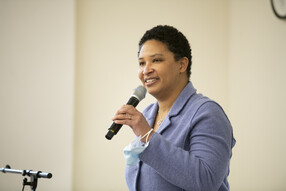
The rest of the day did just that by focusing on the work of GSAS students and alumni, beginning with the keynote address by Danielle Allen, PhD ’01, James Bryant Conant University Professor and director of Harvard’s Edmond J. Safra Center for Ethics. Allen is known for her work on justice and citizenship in ancient Athens and modern-day America, and her topic was Partnering for Democracy. “I pick up this theme for the obvious reason that democracy here at home and around the world is under threat,” she said. “This is a moment of considerable urgency.”
Allen is a member of the American Academy of Arts and Sciences, started in 1780 by John Hancock, John Adams, and other founding fathers who, she said, saw the “need for the learned professions to partner with those who had responsibility for steering the ship of state.” She discussed the kinds of partnering required by recounting her own academic journey, during which she encountered partnerships between professors and students and across lines of race, culture, and academic discipline. “At the end of the day, democracies require judgment,” she said. “They ask ordinary people to come together to make judgments about the direction a society should choose.” She compared universities with symphony conductors in their ability to bring together various kinds of understanding to support good decisions.
At the end of the day, democracies require judgment. They ask ordinary people to come together to make judgments about the direction a society should choose.
— Danielle Allen, PhD ’01
She invited the audience to consider their own networks and look for opportunities for “partnering with democracy” to bring about “key reforms we need to secure a healthy 21st century”—reforms like increasing the size of Congress, instituting term limits for the Supreme Court, and building spaces for local civic deliberation. “We have been so fortunate to have the kind of training that the Graduate School of Arts and Sciences provides and have so much to give,” she said. “And the way we can give it is by partnering.”
Focus on Climate Change
The afternoon’s first faculty presentations looked at the climate crisis from both an economic and a biological perspective. In the first, AJ Meyer Professor of Energy and Economic Development at Harvard Kennedy School and GSAS Director of Graduate Studies for Public Policy Robert Stavins, PhD ’88, asked, “What Can an Economist Possibly Have to Say about Climate Change Policy?”
Current arguments are often framed as “either the environment or the economy,” Stavins said but maintained that the two topics are inextricably intertwined. “The causes of environmental problems are fundamentally economic,” he said. “They’re the unintended side effects of companies producing goods and services that you and I want.” On the flip side, “the consequences of environmental problems have important economic dimensions” that can even be existential, particularly for small island states.
Both, of course, are global issues, and squaring them is difficult. After explaining in some detail why economists favor carbon pricing in the form of carbon taxes and cap and trade schemes, Stavins, who recently returned from the Conference of Parties in Glasgow, turned toward the 2015 Paris Climate Agreement, which he said was based in large part on the Harvard Project on Climate Agreements.
I guess I have to state it as a hope that some of the best scientists, lawyers, and even economists will design some of the climate policies that are scientifically effective, economically sensible, and hopefully politically feasible.
— Robert Stavins, PhD ’88
“Whether [the Paris Agreement is] truly successful is not going to be known for decades,” he said. “There are two necessary conditions for ultimate success. One is adequate social participation; that has been achieved in spades...But there’s another necessary condition, and that’s adequate ambition of individual policies, plus, of course, adequate compliance.”
Stavins ended on an optimistic note, in part because of the bottom-up nature of climate solutions happening mostly in US states, and, perhaps even more, because he sees GSAS students and alumni getting involved at the federal level.
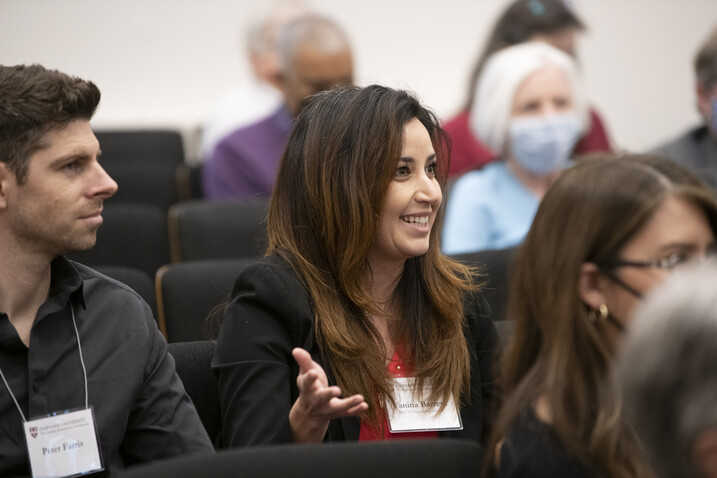
“I guess I have to state it as a hope,” he said, “that some of the best scientists, lawyers, and even economists will design some of the climate policies that are scientifically effective, economically sensible, and hopefully politically feasible.”
The second morning session, “Programming Biology for a Sustainable Planet,” was also devoted to developing a more eco-friendly world, this time starting with the food supply. It was led by Pamela Silver, the Elliott T. and Onie H. Adams Professor of Biochemistry and Systems Biology at HMS, and Marika Ziesack, PhD ’18, a staff scientist at the Wyss Institute.
Silver spoke first, reminding the mostly older audience about the slogan “Better living through chemistry,” used by the American conglomerate DuPont from the 1930s through the 1980s. She talked about the bionic leaf she developed with Harvard’s Patterson Rockwood Professor of Energy Daniel Nocera and postdoc Kelsey Sakimoto. “You shine light on it and it makes hydrogen” that can be used as a fuel, she said. She also talked about a potent pathogen-free fertilizer that doesn’t harm the soil or the environment. In 2018, Silver co-founded the company Kula Bio, a startup that produces sustainable nitrogen-based biofertilizers to replace today’s synthetic fertilizers, which contribute significantly to greenhouse gases.
“The opportunities to integrate different fields and the integration between, for example, computer science and biology and chemistry is already happening and will only expand,” she said, introducing a “synthetic biology hive” she has founded and co-directs with Mike Springer of the Blavatnik Institute. “People ask what hive stands for and actually they’re just hives,” she said, “although I could say it’s the Harvard Institute for Very Exciting Stuff.”
With that, she introduced Ziesack, who spent almost a decade in Silver’s lab before going on to found her own company, Circe Biosciences, in 2021. “Circe was a Greek goddess who transformed things,” Ziesack said. “We’re transforming CO2 into food.” Referring to chocolates that she gave out to the audience at the start of the session, Ziesack revealed that some were made not with greenhouse-gas-intensive animal products whose “fats are the key to deliciousness,” but with microbes, through a novel and proprietary aerobic gas fermentation system.
“Currently we have to make a choice between flavor or footprint,” she said. “Vegan cheese and other sustainable products now just don’t live up to most people’s expectations. We’re trying to change that because we need more people to eat low-carbon foods.” Microbes, she said, are a key to creating plant-based foods that taste good. “We’re overlooking 3 trillion organisms out there that can help us live off the land in a more sustainable way.”
Big Data
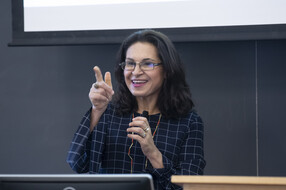
The second set of faculty sessions took on the great opportunities—and daunting challenges—presented by the era of big data. In “A Matter of Life and Breath: Using Data Science to Stop Air Pollution and Climate Change,” Francesca Dominici, the Clarence James Gamble Professor of Biostatistics, Population, and Data Science at the Harvard T.H. Chan School of Public Health and the co-director of the Harvard Data Science Initiative, discussed how new sources of data can inform regulatory policy broadly and have a hand in stopping climate change.
Dominici leads a group of 60 to 70 undergraduate, master’s, and PhD students as well as doctoral fellows across the University who contribute to what she called the largest data platform in the world studying the health consequences of climate change and air pollution. Among the kinds of data being collected are the health records—anonymized, of course—for every individual over 65 in the United States, including their age, gender, race, and zip code; satellite data, Google land use analyses, morbidity and mortality data; socioeconomic data and data on natural phenomena like drought, cyclones, hurricanes, and wildfires. This information can then be examined in various ways and analyzed through atmospheric chemistry models and machine learning to inform regulatory policy.
“All these kinds of data are imprecise per se,” she said, “but we can combine them to get much more high-level information.”
Among the important findings so far is that “for the first time we have been able to provide strong evidence that breathing levels of air pollution below the national quality standard are still increasing mortality rates,” Dominici said, adding that she hopes the Environmental Protection Agency’s standards of 12 micrograms of inhalable particulates per cubic meter of air will be lowered to five micrograms per cubic meter by the Biden Administration. Ultimately, she said, “if we implement stricter regulations to clean up our air, not only are we breathing cleaner air, which I’m sure everyone appreciates, but at the same time, it’s the most effective way to target and reduce greenhouse gas emissions.”
We are perhaps in a kind of moment of the Wild West for social media now.
— Professor James Engell, PhD ’78
The final session, “The Rhetoric of Social Media,” explored the ways that social media—and the data collected by such platforms—shape how we communicate and live. Gurney Professor of English Literature and Professor of Comparative Literature James Engell, AB ’73, PhD ’78, began by asking questions of his listeners. “Who here in this room has a social media account?” Most hands went up. “What do you think that company and the affiliates it deals with know about you?” Responses, including “contacts,” “friends,” and “shopping habits,” didn’t begin to scratch the surface, according to Engell. “They might know what your political preferences are,” he said. “They might know whether you’re married or divorced. If you’re married, they might know whether you’re having an affair. Oh yes, it’s true! They might know whether you’re an alcoholic or not.” In aggregate, this information and more, he continued, “now surpasses oil as the world’s most valuable asset. It’s worth trillions of dollars.”
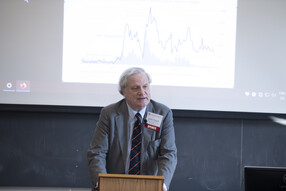
And while he conceded that “there’s a lot of good social media can do,” including being “a lifeline” for people like Engell’s friend with Parkinson's Disease who has trouble going out into society, it can also cause great harm. Engell pointed to the detrimental effect of social media on children as well as the role that Facebook played in recent elections, enabling bad actors to influence voters in the US and the UK. “We are perhaps in a kind of moment of the Wild West for social media now,” he said. With Facebook’s independent oversight board—started by Harvard Law School professor Noah Feldman—still “in its relative infancy,” Engell said, Congress should regulate the platform more rigorously.
Engell pointed out eight ways in which the rhetoric of social media is different from the traditional study of rhetoric, which he still teaches at Harvard. Social media rhetoric is not limited by time or space, he said, but is “constantly there”; it is the audience that is “in effect doing the labor, yet it is also we who are being commodified”; and the audience most subject to manipulation is largely made up of those who “feel they have already been cheated or ignored and that the system is rigged against them.”
He ended by expressing the hope that this “wonderful new world...is not Aldous Huxley’s Brave New World,” in which, as author Neil Postman wrote in 1986, “people will come to love their oppressor and adore the technologies that undo [their] capacity to think.”
* * *
Couldn’t make it to this year’s Alumni Day? It’s not too early to start planning ahead for 2023. GSAS will be in the midst of a year-long celebration of the School’s 150th anniversary that will include exciting programming involving former students all across the globe and a “souped-up” alumni weekend next spring. Watch the GSAS website and School communications in the months ahead for more information!
Photos by Tony Rinaldo
Get the Latest Updates
Join Our Newsletter
Subscribe to Colloquy Podcast
Simplecast Stitcher


